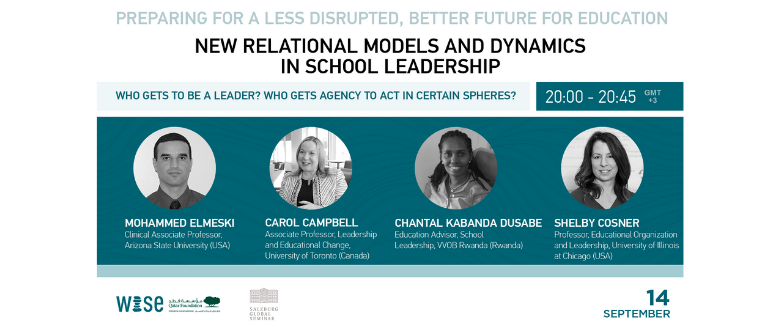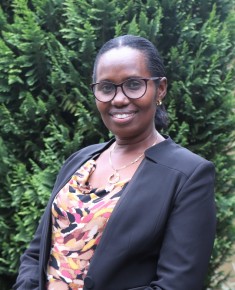
The WISE ‘Education Disrupted, Education Reimagined’ series brought together educators from around the world to discuss the impact of the COVID-19 pandemic on education systems now and in the future. For the final and third part of the series, VVOB colleague from Rwanda Chantal Kabanda Dusabe joined the virtual discussions: “Professional learning communities play a key role in supporting school leaders to help battle their sense of isolation as well as to prepare for school reopening.”
The COVID-19 pandemic and subsequent school closures have shaken the world’s education systems as we know them to their foundations. It also geared up the conversation on what learning in the 21st century should look like. WISE and Salzburg Global Seminar asked the following question out loud: “If we are serious about accelerating such transformation of our learning systems, isn’t it also necessary to consider the implications for our educators and school leaders?”
While COVID-19 was raging, WISE and Salzburg Global Seminar organised a 3-part online convening series ‘Education Disrupted, Education Reimagined’ that examined the role of school leadership during and beyond COVID-19. On 14 September, part III invited thoughts on New Relational Models and Dynamics in School Leadership. Colleague Chantal Kabanda Dusabe (right), VVOB school leadership advisor in Rwanda, joined the panel on ‘Who gets to be a leader? Who gets agency to act in certain spheres?’.
Below the box, you can find a rewrite of Chantal’s contribution to the panel.

In Rwanda, VVOB has contextualised the UNESCO toolkit on Supporting teachers in back-to-school efforts, to adapt it to the needs of school leaders in Rwanda. The toolkit introduces the six dimensions of school reopening. Learn more about the dimensions and how they have helped sector education inspector Theophile Hakizimana and head teacher Louise Ayinkamiye prepare.
Chantal Kabanda Dusabe: “School in Rwanda have been closed since March, when the first COVID-19 case was confirmed. The original plan was to start up the academic year in September, but the number of cases keeps growing. Today [14 September], there are 4501 confirmed cases. 21 people have lost their lives. Nothing is more important than the health and safety of our learners and citizens. The number of cases needs to go down before schools can reopen.
The government is following up the developments closely. Officials are also adamant to properly prepare before classes resume. And while the final decision to reopen schools lies with the government, as was the case back in March to close them in the first place, it is a widely shared among all education stakeholders in Rwanda: The Ministry of Education, Rwanda Education Board, different education development partners, officials at all government levels, school leaders, parent committees and so on.
An important challenge we need to tackle before schools can reopen, are the large class sizes. The government is putting in much effort to build additional classrooms. Education stakeholders across the board have been mobilised by the Ministry to take up leadership roles in this process. Head teachers, teachers and parents are rethinking school infrastructure so social distancing measures can be upheld. They regularly check up on this progress. This shared leadership at school level is also extended to school improvement planning. Leaders at different levels in the school – from the School General Assembly (the supreme organ in terms of learning, teaching and welfare) through teacher leaders down to the student representatives – are called on to be involved in the development of school improvement plans before schools reopen.
COVID-19 has thrown many challenges at the education system. One of them that I want to highlight is the impact of COVID-19 on the socio-emotional wellbeing of learners, teachers, and school leaders. They are isolated from the school environment and their friends or colleagues find themselves under stress because of the uncertainty: when will things go back to “normal”? To address this challenge for learners, Rwanda Education Board has invested in ensuring continued learning for students through radio, television and e-learning. Some families were even provided with radios. Teachers are following up with parents on children’s learning from home. However, not all parents find enough time to spend with their children and support their learning.
School leaders and teachers are also experiencing a drop in their socio-emotional wellbeing. Professional learning communities (PLCs) plays a key role in supporting school leaders to help battle their sense of isolation as well as to prepare for school reopening. PLCs provide opportunities to stay connected, share experiences and learn from each other in these weird times. VVOB supports these monthly PLCs for school leaders, which are facilitated by sector-based government officials called sector education officers. The themes discussed in the PLCs of today are the usual suspects: school reopening, student and teacher wellbeing, health and safety, school improvement plans… School leaders share their fears, challenges and solutions. PLCs are extremely important for capacity development of these actors, but also for their socio-emotional wellbeing.
Education leaders at all levels have understood the importance of collaboration with everyone in the field, no matter the level. PLCs have proven their relevancy. Before COVID-19, shared and distributed forms of leadership were already widespread in Rwandan schools. COVID-19 has further reinforced this commitment to collaboration. We believe that this will continue once schools have reopened.”




